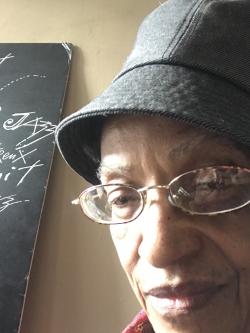Long Verse vs. Short Verse
Folder:
English For Poets .
Choices have to be made. In search of the profound and the not said before, a poet has to edit out the fluff that does not say much. Too many of the same words is the tip off that too much verbosity is underway in a write. I once suggested not writing with the words "the, a, or and". Talk about putting a cramp in the novice writer's style. "but" can go to along with "above". Dealing with exceptions is tricky and the prefered direction for new writers is above because that is where poetic form descends from, I suppose. "Inside" can go to. The point is this: if you discover that you are using the same words in every poem (or short story or novel) then it is time to look up some synonyms. They mean a bit more, carry connotations that enhance the text, and expand your list of repeatable words. Look them up and use them. You know them, you are just internally timid about using them as they are not a usual part of your discourse or in your daily thought lexicon. I do it all the time when I discover an over abundance of the same words happening in descriptions. It is a writer's bane. It is easily cured with a Thesaurus.
.
Length is another choice for poets. How long do I write until the poem is finished? I love the poet who says, "To be continued." I just think, why not finish it now. My method is to write until I circle back to the title's intended theme or until I encounter a pretty good line that sums up the whole nicely. Hence, the long poems. I am currently rewriting 5000 plus poems and proses on postpoems and I am discovering truths - same words, favorites that personally convey so much more to me. Most of them have been replaced, the syntax adjusted appropriately, the tenses made cohesive, and voila, a new and better word carries the theme nicely. It's hard work finding "the right" word.
.
Sometimes I look at a line and do not want to do the work knowing there is a better way of saying out there in brainland somewhere. Sometimes I simply elect to go with it, knowing it has been said by me before. A nice adjective or adverb clause dresses it up a bit, but it is still the same word, ultimately. When I encounter a favorite word, I think and try to find something else and come up blank. Dell has the "smartword" look-up feature and the lists, if not useful, often suggest an alternative. The notation "no synonym found" speaks volumes and explains why you are locked in on that particular word. Thare are no others avaialbe. I rework the line and get rid of the culprit, or, as is my option of lesser preference, leave it as is.
.
Writing short poems is tough - you have to pack in so much in a few words. This style appeals to some writers, but I suspect they are taking the easy way out of being literary. That is so unfair, but writers share their experiences and bits of their lives in their work (optional) and there is so much to share. In my view, how can it be shortend or truncated? Fear of length and owning the ability to sustain voice and poetic thematic balance may be the fear. There is room for short, long, and excrutiatingly long verse in poetry writing. If not, there would be no Haiku and no Epics. New poets will ramble and must do so to discover better ways of saying eventually (or not).
.
I have discovered that the more I write, the more I discover. A few of my really long poems have been broken up into shorter ones for easier digestion. I gave up numbering them under the same title because they always are posted out of order. I will probably continue to write longer poetry with lots of verses. Terse and tight is never going to be a writing style for allets. That said, I am big on discovery of new concepts or the reworking of old concepts and cliches. We are all pirates. Most of what we think absolutely new has been said in ten different ways each by a hundred thousand writers living and dead. Your "new" idea may be scribbled on a cave wall somewhere.
.
My best advice, keep writing and unearth your own truths and style. Long or curt, just write your life entire. :D
.
Lady A
05-07-19
625a
.
